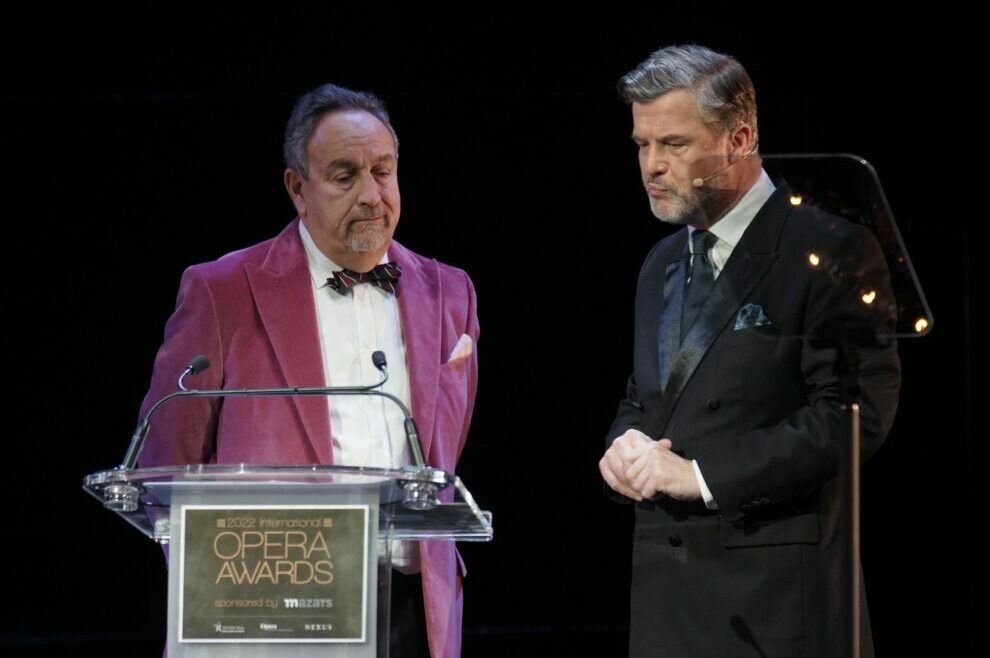
Harry Hyman and Petroc Trelawny at the International Opera Awards ceremony in Madrid 2022
The state of opera
Harry Hyman, founder of the International Opera Awards, reviews the state of opera in the UK and outlines what needs to be done in the year ahead.
The world of opera faced a year of significant challenges in 2024, with financial pressures mounting, echoed across the sector. As we enter 2025, many institutions, especially opera companies, face an uncertain future as they navigate tax increases, shrinking budgets and a shifting cultural landscape – alongside a growing sense of public indifference.
Opera companies have long been pillars of cultural expression, providing invaluable contributions to society. But over the past year, many have come under immense financial strain, not least from the Autumn Budget, which introduced a significant rise in national insurance for employers, dealing a major blow to the UK’s performance arts sector.
Opera houses are typically charities, heavily reliant on public funding, donations and sponsorships. Despite their vital role in the cultural life of the country, they still have to meet financial goals and manage massive deficits.
The dearth of funding is evident across the arts. But for opera, rising operational costs and inflation, makes it challenging for companies to maintain their artistic output.
Struggling to survive
Opera thrives across Europe’s cultural centres – Berlin, Milan and Vienna as well as Madrid, Warsaw and Munich, where the International Opera Awards (IOA) have been hosted for the past three years.
In the UK, however, it’s a different picture. UK opera companies are struggling to survive. Perhaps the most significant development in 2024 was the forced move of the English National Opera (ENO) from its historic home in London to Manchester, driven by financial constraints and a need to cut costs.
This marked a troubling shift, raising concerns about the future of national institutions and the long-term accessibility of opera for audiences in the capital. Similarly, the Welsh National Opera faces a funding crisis that threatens its ability to operate effectively.
Even more worrying are the results of public polling, which reveal that half the UK population would not notice or care if opera houses were to close. For many, opera is seen as a luxury rather than an essential part of the national cultural fabric.
This lack of public awareness and appreciation signals a deepening crisis for the sector, which could lead to the erosion of this rich cultural tradition.
An issue of national identity
The situation in Germany offers a stark contrast. As the host country for the IOA in 2024, Germany demonstrates a commitment to maintaining a thriving cultural landscape. Berlin, with a population of 7 million, was allocated €947 million for culture in 2024.
In contrast, the entire culture budget for England, which has a population of almost 60 million, is just £458.5 million. This striking disparity highlights the vast differences in financial support for the arts between countries, and the growing concern over the UK’s ability to compete on the world stage.
The issue for UK opera is not just financial, it is also one of national identity. Opera has long been a cornerstone of British cultural heritage, representing both the historical grandeur of the nation’s artistic achievements and its ability to innovate and influence the world’s artistic dialogue.
However, the UK is at risk of losing this key aspect of its cultural identity. If iconic institutions such as the ENO, the Welsh National Opera and other regional opera companies are struggling to survive, the UK could see a decline in one of its most cherished art forms.
The closure or downsizing of opera houses will not only leave a cultural vacuum but will also have a ripple effect on the economy, education and tourism. The potential loss of these institutions signifies a deeper loss of national pride and cultural capital.
A proactive role to ensure sustainability
Urgent action required to safeguard the future of opera in the UK. There needs to be a fundamental re-evaluation of how it is funded. The reliance on public funding alone is no longer sustainable; we must explore alternative avenues, including greater collaboration between the public and private sectors, to ensure the longevity of our cultural institutions.
The government must take a proactive role in securing the future of the arts, not only by increasing financial support but also by fostering a more favourable environment for the arts to thrive. This could include tax incentives for donors, increased investment in arts education, and long-term funding strategies to help stabilise organisations facing financial uncertainty.
Moreover, there needs to be a concerted effort to tap into commercial potential. Opera companies should consider expanding their audience base through partnerships with business, innovative fundraising campaigns and the expansion of digital platforms to reach global audiences.
They must embrace new business models to supplement dwindling government funding and ensure they can continue to create world-class productions.
Lookahead to 2025
As we look ahead to 2025, we are at a crossroads. The government’s call for a review of Arts Council England is timely. While the challenges are undeniable, the potential for change and growth is significant.
Opera – and the arts more broadly – has always been a reflection of society’s values and aspirations. Now more than ever, it is time for the UK to recognise its value and take the necessary steps to protect and preserve it for future generations.
Without a radical shift in thinking and funding, the UK risks losing one of its greatest cultural treasures – and with it, a crucial part of its national identity.
Join the Discussion
You must be logged in to post a comment.